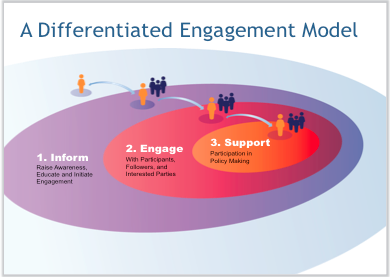1. ICANN: Improving Contributor Capabilities
At ICANN51 in Los Angeles, A number of leaders from ICANN constituent bodies (SOACSGC) met with the ICANN Global Leadership team and posed this question:
“How can we find ways to improve ICANN’s ability to identify and attract new and productive community participation while retaining existing participants who dedicate their time and efforts to ICANN’s work?”
Together they proposed a project team, consisting of Tony Holmes, Bill Drake, Rudi Vansnisk, Sally Costerton and Chris Mondini to address this question.
The group agreed to formulate a problem statement and present it to the SOACSGC group with recommended next steps. The group further agreed to provide initial thinking on 1) obstacles and 2) opportunities related both specifically to SO/AC structures and to ICANN generally.
2. Problem Statements:
1. ICANN lacks ways to increase the number of qualified volunteers to invest the time and effort required to conduct bottom up, multi-stakeholder work.
2. Though there currently exist outreach programs to bring volunteers into ICANN, there is little inreach required to encourage them to stay and be active. [inreach can be understood as active cultivation and engagement of those who are already somehow present within ICANN].
3. The Overarching Question:
How can ICANN get more volunteers to be more meaningfully involved?
4. A Helpful Analogy:
ICANN is a party host and has succeeded in getting more people to turn up for the party, but is not serving appetizers to make them stay for the main course. [In this analogy the invitations are the outreach, and the appetizers are the inreach]
5. A Helpful Diagram:
ICANN engagement focus to date has been on the outer circles and now must turn to the inner circles.
6. Input-Gathering 2x2 Matrix
The attached table is for team members to contribute ideas, as follows:
1) barriers to fuller engagement,
2) possible solutions,
3) general considerations applicable across SOACSGCs, and
4) considerations that are specific to particular SOACSGCs.
Key for inputs:
Tony Holmes = TH
Rudi Vasnick = RV
Bill Drake = BD
Chris Mondini = CM
Sally Costerton = SC
Barriers/Problems | Solutions/Opportunities | |
Generally Across ICANN (all SOACSGC) |
|
|
Specific to SOACSGC group(s) (if referring to specific group please identify) |
|
|
7. Recommended Next Steps
a. Share with SOACSGC November 19
b. Invite broader participation in 2x2 Matrix idea gathering (how?)
c. Gather inputs from those who tried to address this problem in the past
d.
e.
f.
8. Background (Scene Setting):
The growth and increasing complexity of the DNS and unique identifiers are demonstrated by such innovations as new gTLDs, IDNs, and IPv6. ICANN -- already a complex organization -- faces increasing work streams and demands that draw upon the time and energy of a finite supply of knowledgeable volunteers. Furthermore, ICANN finds itself in an evolutionary phase as an organization: governance and structural concerns, as well as attention to external forces in Internet governance further tax the pool of volunteer stakeholders. The challenges facing ICANN are often unpredictable and usually sui generis. No other organization, whether business, government or technical body, has had to grapple with them. As a result, ICANN’s imperative of securing diverse, multi-stakeholder attention on key issues suffers. This problem is a shared challenge for staff and community, and is an existential challenge. ICANN’s sustainability – indeed its future -- depends on solving it.
9. …..
